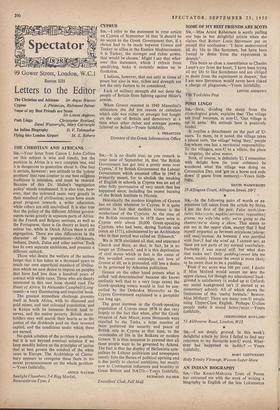Letters to the Editor
The Christian and Africans Sir Angus Watson Cyprus J. Phrantzes, Richmond Palmer
Some of my Best Friends are Scots Sir Linton Andrews
Posh Lingo Christopher Rowland,
David Wainwright, Mary Cartwright
An Indian Biography D. V. Tahmankar Flying into London Airport M. E. Roberts
THE CHRISTIAN AND AFRICANS SIR,—Your letter from Canon I. John Collins on this subject is wise and timely, but the position in Africa is a very complex one, and it is dangerous to generalise about it. One fact is certain, however: any attitude to the 'colour problem' that runs counter to our best religious traditions is mistaken, and must be resisted. Because of this Dr. Malan's 'segregation policy' stands condemned. It is also true, how- ever, that the coloured races vary greatly in their standard of civilisation; some have made great progress towards a wider education, while others are still uncivilised. It is also true that the policy of the different African govern- ments varies greatly in separate parts of Africa. In the French and Belgian sections, as well as the Portuguese, there is (in theory at least) no colour bar, while in Dutch Africa there is still segregation. There are also differences in the character of the populations—Afrikaners, Indians, Dutch, Zulus and other natives. Each has its own separate ambitions,,and presents a different outlook.
Those who desire the welfare of the natives forget that it has taken us a thousand years to reach our own superficial standard of civilisa- tion which we now desire to impose on peoples that have had less than a hundred years of contact with white races. Those who are deeply interested in this vast issue should read The Heart of Africa, by Alexander Campbell (Long- mans)—a very illuminating and impartial book.
The greatest immediate challenge presents itself in South Africa, with its diamond and gold mines, and vast coloured population, and in Kenya with its immense British land re• serves, and the native poverty. British share- holders may well search their hearts as to the justice of the dividends paid on their invested capital, and the conditions under which these are earned.
No quick solution of the problem is possible, but it is not beyond eventual solution if we keep steadily before us the principles of justice that at best govern the conduct of the white races in Europe. The Archbishop of Canter bury appears to recognise these facts in his recent pronouncement on the whole problem —Yours faithfully, Newcastle-on-Tyne, 1
































 Previous page
Previous page